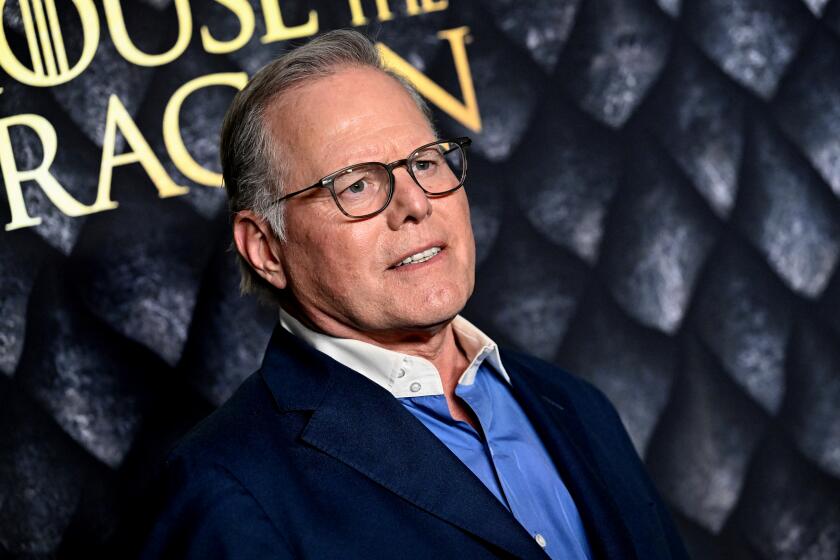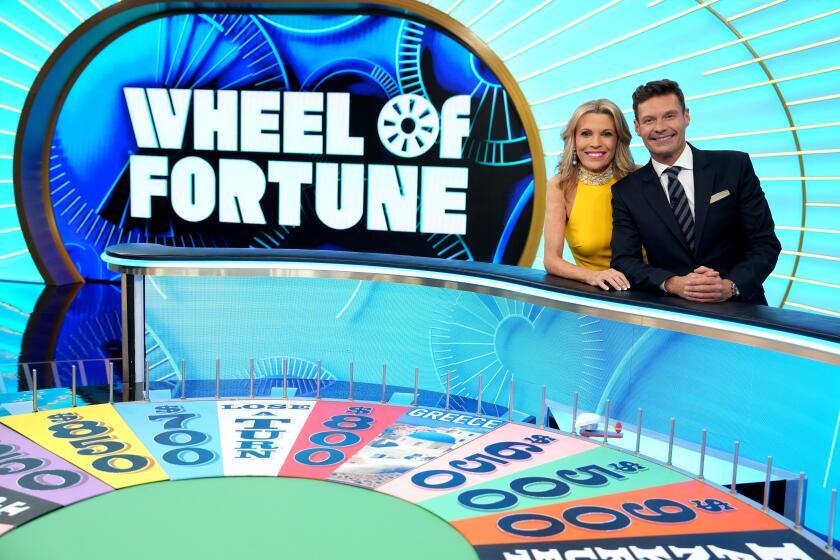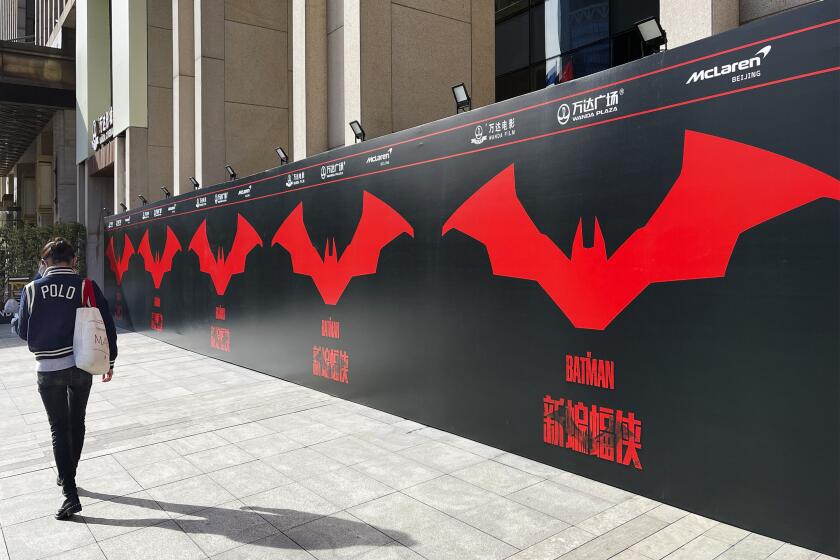Why Hollywood is not alarmed enough about Gen Z

- Share via
Last week, people from all over the film industry descended on Las Vegas to debate the future of the theatrical experience at CinemaCon, the annual celebration of in-person moviegoing.
But while attendees were taste-testing theater snacks, watching “Superman” footage and hand-wringing about attendance levels, a more consequential conversation was playing out in the media business.
A new survey of U.S. consumers suggested that for Gen Z, generally those people born between 1997 and 2012, the traditional storytelling mediums of movies and television shows have lost much of the relevance they held for previous generations.
The key theme that sounded the alarm for show business executives: The way young people consume entertainment is changing. And Hollywood isn’t paying enough attention.
The threat isn’t coming from streaming, which has been the source of much of legacy media’s anxiety during the last several years. Instead, it’s coming from social media platforms — TikTok, Instagram, YouTube and the like — and the personalities that dominate them.
According to Deloitte’s 2025 Digital Media Trends report, 56% of Gen Z respondents say social media content is more relevant to them than traditional content, including TV series and movies. Comparatively, only 43% of millennials and 26% of Generation X agree with that statement.
Similarly, the majority of Gen Zers said they feel a stronger personal connection to social media creators than to TV personalities and actors, according to the report, which surveyed 3,595 U.S. consumers in October.
Gen Z collectively spends more time consuming media and entertainment than its elder siblings and parents (6.9 hours a day, versus 6.3 hours for millennials and 6 hours for Gen X), but less time watching movies and shows on TV or on streaming services.
Those preferences aren’t going away, and they should be worrying for studios, TV networks and even such tech giants as Netflix and Amazon, which are obsessed with acquiring as much of people’s attention as possible.
Another fact of life not to be ignored: the increasing dominance of YouTube. The Google-owned video giant in February captured 11.6% of U.S. TV viewing, topping all other distributors (including Disney and Netflix) for the second time since Nielsen began tracking such data in November 2023. Research firm MoffettNathanson crowned YouTube as “The New King of All Media” in a research report last month.
“The center of gravity in youth is not Hollywood. It just isn’t,” said Kevin Mayer, co-founder and co-chief executive of Los Angeles-based Candle Media, during a recent talk hosted by the Paley Center for Media in Beverly Hills. “This isn’t happening in the future. It’s happened already.”
Mayer’s perspective is a useful one. Candle Media owns “CoComelon” producer Moonbug Entertainment and Reese Witherspoon’s production company Hello Sunshine. He was also briefly the CEO of TikTok, and before that spent years as Walt Disney Co.’s top deal architect under Bob Iger.
People in Mayer’s position know that the shifting habits of younger audiences aren’t the only threats to the entertainment industry as we know it.
As we’ve written before in this column, studios are getting hammered by a dramatic economic evolution that shrunk profits, leading to massive layoffs, uncertainty and pressure to consolidate.
Until recently, the pay-TV model allowed entertainment companies to “over-monetize,” meaning their content was earning more than it was really worth.
The practice of bundling TV channels, thus making consumers pay for everything in order to watch what they really wanted, was hugely profitable, but unsustainable in the face of the internet. The music industry learned this the hard way, when $25 CDs gave way to free (e.g., pirated) single-track MP3s, followed by streaming.
The cable and satellite TV business is now being supplanted by streaming, which is less profitable.
So how concerned should Hollywood be about all this? In Mayer’s words, “very, very concerned.”
“Not only is Hollywood becoming less and less relevant,” Mayer said, but “the time that’s spent is less profitable.” Mayer said there’s been “some alarm” over the profound secular challenge the entertainment industry is facing, “but maybe not quite enough.”
None of this means that young people aren’t interested in movies or going to theaters. Recent examples suggest that when studios put out movies that are relevant to Gen Z’s interests, and market them effectively, they can create massive returns.
This past weekend’s box office smash, “A Minecraft Movie” from Warner Bros. and Legendary, showed how harnessing youth culture — in this case, video game intellectual property — can pay off in a big way. The film, starring Jason Momoa and Jack Black, grossed $163 million in the U.S. and Canada during its opening weekend, more than double what most analysts were expecting.
Families were a big part of the weekend bonanza. More than half of tickets were sold to families going together and 26% of moviegoers were under 13, according to data firm EntTelligence. But Gen Z audiences, many of whom grew up with Minecraft, were an important segment too. About 31% of attendees were 13 to 25 years old, EntTelligence said.
Tapping into the enthusiasm of the game’s fans delivered a huge win, as it did for Universal and Blumhouse with 2023’s “Five Nights at Freddy’s.”
So there are still ways to entice young people to the movies and other traditional forms of entertainment. There are Gen Zers who love to pack repertory screenings, storm Letterboxd with their film diaries and test the limits of their AMC Stubs A-List subscriptions. When they get behind something, it can go viral.
But the entertainment industry needs to figure out more smart ways to make good movies and TV shows that are relevant to young people today, and market them strategically.
If you ask Mayer or his old boss, Iger, for the best way to keep the business healthy, they’ll say it’s to focus on quality. In other words, Hollywood needs to give Gen Z something to talk about.
You’re reading the Wide Shot
Ryan Faughnder delivers the latest news, analysis and insights on everything from streaming wars to production — and what it all means for the future.
You may occasionally receive promotional content from the Los Angeles Times.
Stuff we wrote
‘It was just a free-for-all’: What happened to Kanye West’s Donda Academy? Lawsuits and interviews The Times conducted provide a fresh glimpse into the extraordinary dysfunction inside Donda and the erratic behavior of its controversial founder that led to its unraveling.
Broadcast television is in trouble. Stations are asking Washington for help. As the audience moves to streaming, TV station groups are lobbying to have longstanding ownership caps lifted so they can better compete with tech firms.
Sequels, Beatles and embattled studios: What we saw at CinemaCon 2025. Coming off a tough first quarter at the box office, studios showed off their best films, and in some cases, star-studded casts, at the annual CinemaCon trade show in Las Vegas.
Disney plans to vacate storied Fox lot in Century City by year’s end. Disney’s lease for space on Fox’s Pico Boulevard compound in Los Angeles expires next March. The company has no plans to renew its lease and plans to vacate by year’s end, Disney insiders said.
Steve Kornacki exits MSNBC for new deal with NBC News and NBC Sports. The khaki-wearing data analyst’s new deal allows him to pursue projects on other networks and media platforms, as long as they are unrelated to politics and sports.
With studio chiefs in the hot seat, Warner Bros. bets on an ambitious film lineup. Warner Bros. film studio has seen a string of box office disappointments, including “Mickey 17” and “The Alto Knights.” Will its ambitious slate, including “A Minecraft Movie,” turn around its prospects?
Top movie theater lobbyist calls for a minimum of 45 days before films hit streaming. Cinema United trade group Chief Executive Michael O’Leary called on studios to extend most films to a 45-day theatrical window before home video and streaming, arguing that a baseline is needed to give moviegoers clearer expectations.
ICYMI:
- Deborah Norville will leave ‘Inside Edition’ at season’s end, with ‘exciting things’ planned
- Amber Ruffin explains the lesson she learned when she was disinvited from WHCA dinner
Numbers of the week

There’s plenty of stock market chaos right now.
But my number of the week is whatever Newsmax is worth today.
The MAGA-friendly cable news network went on a wild ride on Wall Street last week, and that’s saying something at a time when the stock market was in a spiral because of Trump’s “Liberation Day” tariffs.
Following its initial public offering, Newsmax’s stock soared from $10 a share to as high as $279, briefly valuing the company at more than $20 billion. That’s a remarkable valuation for a company that lost $55 million in the first half of 2024 on revenues of $80 million, according to regulatory documents.
As my colleague Stephen Battaglio wrote, the company clearly benefited from the enthusiastic support of Trump fans as the network promoted the stock on its airwaves.
Anyway, the high didn’t last.
The shares closed Wednesday at $52.52, down 80% from their intraday peak last Tuesday. On Monday, the stock closed at $47.12.

“The White Lotus” gave HBO a viewership boost Sunday night.
The third season finale of Mike White’s acclaimed and hotly debated satirical drama drew 6.2 million U.S. viewers on HBO and streamer Max, up 30% from the previous week, according to Warner Bros. Discovery.
Viewership for the episode was up 51% from the Season 2 finale. Next up for HBO is Season 2 of “The Last of Us.”
Film shoots
The latest local on-location movie, TV and commercial shoot data from FilmLA.

Finally ...
Listen: San Francisco’s shoegaze-y metalheads Deafheaven have a huge new album out, “Lonely People With Power.”
Inside the business of entertainment
The Wide Shot brings you news, analysis and insights on everything from streaming wars to production — and what it all means for the future.
You may occasionally receive promotional content from the Los Angeles Times.




